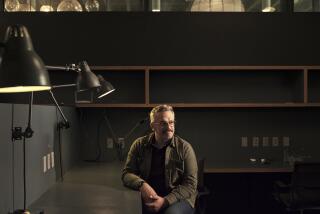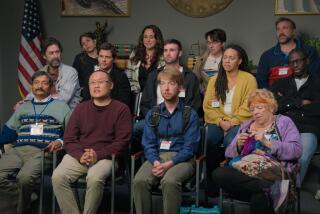Telling Lawyers How to Make a Jury Trust
- Share via
MIAMI — To win a case before a trial jury, a lawyer needs something not taught in law school, says Iris Acker, a veteran actress and TV producer.
She calls it “courtroom demeanor.”
For years, Acker has been coaching lawyers on how to speak, dress and establish credibility with jury panels.
“In law schools, attorneys are helped with everything except their bad habits,” says Acker, who began her show business career at age 11 in her native Bronx. “An attorney must have believability, so no matter what you say no one will doubt you.”
Teachers, Acker says, rarely correct students for choppy sentences, cutting off words, swaying from side to side when they speak or for not looking at the person they address.
“If you don’t look a jury in the eye, they won’t trust you,” says Acker, who produced a 13-week series called “The Jury Box” at WLRN during her 5-year tenure at the public TV station here.
Using a real judge and two practicing lawyers, the program put issues on trial with actors serving as witnesses and jury.
A lengthy career in the theater has given her the wherewithal to teach voice projection and modulation, not only to lawyers but to celebrities who are to be interviewed on TV.
At her studio in North Miami, Acker, who gives her age as 50-plus, also advises lawyers on courtroom attire.
“They should wear nothing that’s disconcerting--avoid stripes, polka dots and wild ties,” she says. “Nothing should detract from what you’re saying.”
A self-described workaholic, Acker is in demand for TV ads and acts in area theaters. She often gets parts in movies made in South Florida and will be seen in “Cocoon II,” soon to be released.
At her studio, she teaches aspiring actors how to audition for commercial work. She has made a videocassette and written a book on the subject.
This is her fifth year as producer-host of “On Stage,” a weekly half-hour celebrity interview show on public TV that relates to the performing arts.
She became involved with lawyers when, several years ago, she was invited to a seminar at Nova University in Ft. Lauderdale.
“It was for attorneys who wanted career changes and to get back to courtroom work,” she says. The seminar included mock court trials.
“I was to critique attorneys on how they handled themselves--physically and verbally--in court.”
Her work was a success. She returns to Nova each year to help graduating law students with their courtroom demeanor.
“I know being coached by her has helped me turn a corner,” says Ellen Leesfield, a Miami trial lawyer. “She has helped my ability to present myself to judges and juries.”
Acker believes that her expertise would be useful to politicians.
After watching the vice presidential debate, she says: “If I had (Sen. Dan) Quayle, what a job I could do with him. He was politically coached but not dramatically coached. He needed me.”
More to Read
The biggest entertainment stories
Get our big stories about Hollywood, film, television, music, arts, culture and more right in your inbox as soon as they publish.
You may occasionally receive promotional content from the Los Angeles Times.










